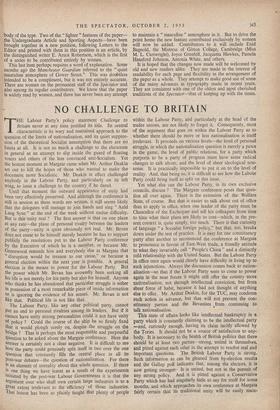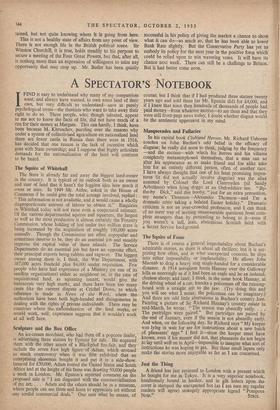NO CHALLENGE TO BRITAIN
THE Labour Party's policy statement Challenge to Britain never at any time justified its title. Its central characteristic is its wary and restrained approach to the question of the limits of nationalisation, and its quiet suppres- sion of the theoretical Socialist assumption that there are no limits at all. It is not so much a challenge to the electorate in general as an attempt to ,slip inside the guard of floating voters and others of the less convinced anti-Socialists. Yet the hottest moment at Margate came when Mr. Arthur Deakin set out to kill the hopes of those who wanted to make the document more Socialistic. Mr. Deakin in effect challenged anybody in the Labour Party, and particularly on its left wing, to issue a challenge to the country if he dared.
Until that moment the outward appearance of unity had been very effectively preserved. And although the conference is still in session as these words are written, it 5411 seems likely that the delegates will manage to join hands and sing " Auld Lang Syne " at the end of the week without undue difficulty. But is this unity real ? The first answer is that on one plane at any rate—the plane of personal rivalry between the leaders of the party—unity is quite obviously not real. Mr. Bevan does not cease to be himself merely because he has to support Publicly the resolutions put to the Labour Party conference by the Executive of which he is a member, or because Mr. Greenwood reminds him and everybody else at Margate that " disruption would be treason to our cause," OF because a general election within the next year is possible. A general election is the means to power for the Labour Party. But the power which Mr. Bevan has avowedly been seeking all his life is not merely for his party but also for himself. Anyone Who thinks he has abandoned that particular struggle is either in possession of a most remarkable piece of inside information or is ignoring the evidence of his senses. Mr. Bevan is not like that. Political life is not like that.
The Labour Party, like any other political party, cannot Put an end to personal rivalries among its leaders. But if it cannot have unity among personalities could it not have unity of policy ? Could the course of the ship be so firmly fixed that it would plough surely on, despite the struggle on the bridge ? That is perhaps the most responsible and purposeful question to be asked about the Margate conference. Here the answer is certainly not a clear negative. It is difficult to see how the party could genuinely split itself in two over the one question that constantly fills the central place in all its Post-war debates—the .question of nationalisation. For there is an element of unreality about this whole question. If there is one thing we have learnt as a result of the experiments initiated by the post-war Labour Governments it is that the argument over who shall own certain large industries is to a great extent irrelevant to the efficiency of those industries. That lesson has been so plainly taught that plenty of people within the Labour Party, and particularly at the head of the trades unions, are not likely to forget it. Consequently, most of the argument that goes on within the Labour Party as to whether there should be more or less nationalisation is itself irrelevant. It proceeds on various levels—the level of personal struggle, in which the nationalisation question is merely a pawn in the game; the level of public relations, for a party which purports to be a party of progress must have some radical changes to talk about; and the level of sheer ideological non- sense. It is practically impossible to put it on to the level of reality. And, that being so, it is difficult to see how the Labour Party could bring itself to split on this issue.
Yet what else can the Labour Party, in its own exclusive councils, discuss ? The Margate conference poses that ques- tion all over again. There is the extension of the Welfare State, of course. But that is easier to talk about out of office than to apply in office, when one leader of the party must be Chancellor of the Exchequer and tell his colleagues from time to time what their plans are likely to cost—which, in the pre- sent context is, quite simply, too much. There is that curiosity of language " a Socialist foreign policy," but that, too, breaks down under the test of practice. It is easy for one constituency party after another to recommend the conference at Margate to pronounce in favour of East-West trade, a friendly attitude to what they invariably call " People's China " and a distinctly Cold relationship with the United States. But the Labour Party in office once again would clearly have difficulty in living up to such injunctions. Always the discussion comes back to nation- alisation—so that if the Labour Party were to come to power again in the near future it might still offer the country more nationalisation, not through intellectual conviction, but from sheer force of habit, because it had not thought of anything else to offer. Mr. Arthur Deakin, for the TUC, may condemn such action in advance, but that will not prevent the con- stituency parties and the Bevanites from continuing to talk nationalisation.
This state of affairs looks like intellectual bankruptcy in a party which is constantly claiming to be the intellectual party .—and, curiously enough, having its claim tacitly allowed by the Tories. It should not be a source of satisfaction to any- body. It is necessary to the health of British politics that there should be at least two parties—strong, united in themselves, and pitted against each other in the attempt to resolve real and important questions. The British Labour Party is strong. Such information as can be gleaned from by-election results and the Gallup poll indicates that, among the electori, it is now getting stronger: It is united, but not in the pursuit of any strong policy. And it is pitted against a Conservative Party which has had singularly little to say for itself for some months, and which approaches its own conference at .Margate fairly certain that its traditional unity will be easily main- tained, but not quite knowing where it is going from here.
This is not a healthy state of affairs from any point of view. There is not enough life in the British political scene. Sir Winston Churchill, it is true, holds steadily to his purpose to secure a meeting of the Four Great Powers, but that, after all, is nothing more than an expression of willingness to seize any opportunity that may crop up. Mr. Butler has been quietly successful in his policy of giving the market a chance to show what it can do—so much so, that he has been able to lower Bank Rate slightly. But the Conservative Party has yet to embody its policy for the next year in the positive form which could be relied upon to win wavering votes. It will have its chance next week. There can still be a challenge to Britain. But it had better come soon.



















































 Previous page
Previous page